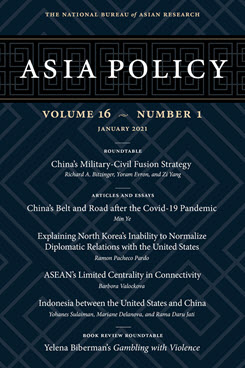China’s Military-Civil Fusion Strategy: Development, Procurement, and Secrecy (Introduction)
This roundtable investigates important aspects of China’s Military-Civil Fusion strategy, including lessons from China’s past experience of civil-military integration, the effects on China’s military procurement system, and the influence of the state secrecy system.
Hailed by the Chinese government as a cornerstone of national rejuvenation, Military-Civil Fusion (MCF) has captured domestic and international headlines in recent years. While in China the focus of reports is on how MCF will benefit the defense industry, the People’s Liberation Army (PLA), and national strategic goals, the principal concerns of Western analysts are how the strategy will strengthen PLA capabilities and the possible transfer of dual-use technologies to MCF participants.
To better understand questions surrounding MCF and assess the progress of the strategy, the S. Rajaratnam School of International Studies (RSIS) at Nanyang Technological University organized a workshop in February 2020 featuring scholars from a multitude of countries to examine MCF’s structure, outcomes, challenges, and global implications. This roundtable features three papers and presentations from the workshop. Each author investigates a particular aspect of MCF, including lessons from China’s past experience of civil-military integration, the effects on China’s military procurement system, and the state secrecy system’s influence on MCF developments.
Richard Bitzinger’s essay provides an overview of how MCF arose and the potential future prospects for the initiative. From the early 1980s to 2017, the Chinese government made several attempts at civil-military integration to little effect. Despite moderate gains in some areas of cooperation, the development of dual-use technology remained limited, as were technological transfers from the commercial sector to the military.
The main problem during these earlier ventures, according to Bitzinger, was the inability of the civilian and military authorities to formulate and implement a civil-military integration-specific development strategy. Therefore, it is no surprise that under Xi Jinping’s administration China is trying to turn over a new leaf on civil-military integration by devising a comprehensive MCF strategy with the goal of bringing technological benefits to the PLA. However, MCF is a multiyear initiative covering wide swaths of China’s defense sector, and results might not be clearly visible in the short run. Regardless, Xi’s government seems fully committed to the strategy, and the long-term implications could pose a substantial challenge to the United States and its allies.
Yoram Evron’s essay examines the influence of MCF on PLA procurement. Traditionally, the Chinese military procurement system has been constrained by a number of challenges, such as technological backwardness, poorly regulated client-supplier ties, and limited access to Western arms. Despite a series of reforms over the years, these impediments remain in place. A key aim of MCF is to improve the military procurement system. As such, civilian enterprises are expected to partake in the production, maintenance, support, and service of military equipment, as well as in obtaining and integrating foreign dual-use technologies. But out of all the procurement phases, MCF devotes most of its attention to military technology research and development. At present MCF has not significantly improved the procurement system. Legal, bureaucratic, and functional hurdles remain, and the government has not fostered the necessary conditions for large-scale civilian participation in military procurement. The most immediate effect of MCF on China’s military buildup is introducing foreign, state-of-the-art know-how to advanced high-priority systems and subsystems, which could have palpable strategic impact in the long run.
Last but not least, my essay on MCF and China’s state secrecy system argues that despite the allowance of limited defense industry transparency to attract private enterprise to MCF, the state’s preference for secrecy, which has grown under Xi, will hamper development of the strategy. Since its early years, the Chinese Communist Party has prioritized secrecy. In fact, the maintenance of secrecy contributed to its success in taking over China. The party’s founders regularly stressed the importance of keeping secrets, and the tradition lives on to this day. I illustrate this point for MCF by mapping the Chinese state secrecy system and how exactly it operates in scientific research universities, which are playing an increasingly vital role in the strategy. Yet, when economic and security interests collide, the state usually favors the latter, and the strictness of the secrecy system has certainly deterred potential MCF participants from the civilian sector.
MCF has global security and economic implications. The PLA is the leading beneficiary, whereas countries under pressure from China’s assertive foreign policy, as well as corporations with dual-use technologies that could benefit PLA capabilities, will feel MCF’s adverse influence. Therefore, policymakers, security specialists, and corporate executives in liberal democracies must take note of MCF and invest in understanding its diverse and long-term implications. Moreover, policy experts on commerce, trade, and security should closely monitor developments of the strategy and design appropriate policy measures to preempt or counteract negative ramifications. Despite the challenges ahead for MCF, it has strong backing from the state and will continue to expand into new territories. Consequently, equal commitment is needed in tracking developments and devising appropriate policies and countermeasures.
Zi Yang is a PhD student in the S. Rajaratnam School of International Studies (RSIS) at Nanyang Technological University (Singapore). His research focuses on China’s military. Mr. Yang’s recent publications include a Center for Strategic and International Studies report with Jeff Benson titled “Party on the Bridge: Political Commissars in the Chinese Navy” (2020) and a Routledge Handbook chapter “Character Assassination and the Contemporary Anti-Corruption Campaign in the Chinese Military” (2019).
About Asia Policy
Asia Policy is a peer-reviewed scholarly journal presenting policy-relevant academic research on the Asia-Pacific that draws clear and concise conclusions useful to today’s policymakers. Asia Policy is published quarterly in January, April, July, and October and accepts submissions on a rolling basis. Learn more


